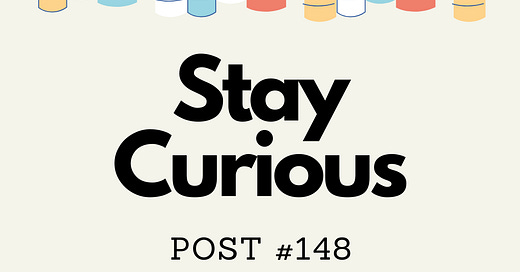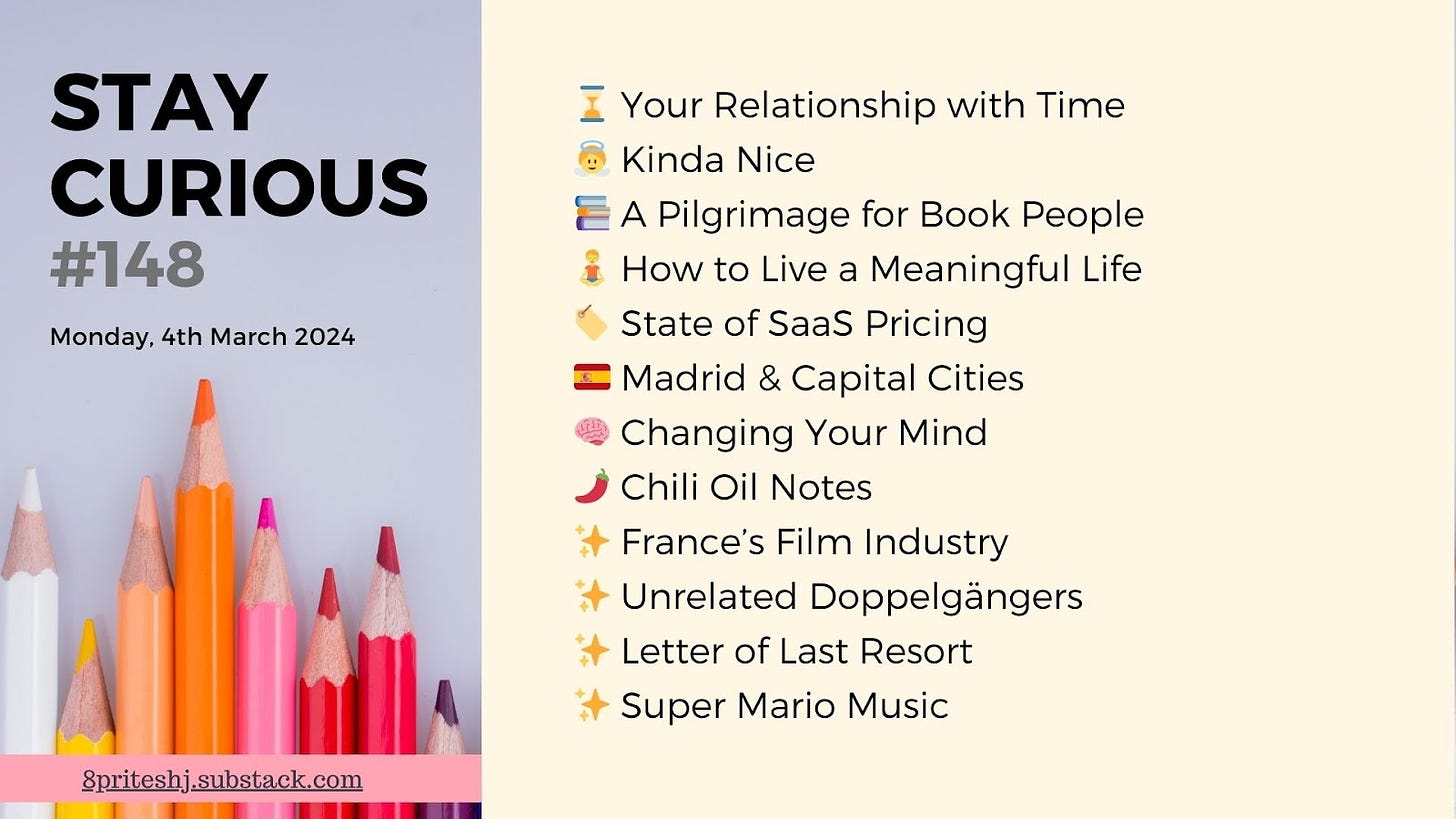📚 Pilgrimage for Book People, Your relationship with time, Changing your mind, Kinda nice
French film industry, Chili oil notes + a lot more for the curious YOU
Hi and welcome to the post #148.
I am in the middle of the book “Unreasonable Hospitality” by Will Guidara and loving every bit of it. I picked it from the episode Fork from “The Bear” (S2E7). If you have still not seen this yet, I highly recommend (again) to go for it. It’s a masterclass in many things — understanding customer delight, hospitality, finding your passion and chasing it — being some of those.
For today’s post, here’s the lineup:
As usual, I loved curating this spread for you curious folks. I hope you like it. If you do, hit the ❤️ at the start or end of the post to show your love.
Let’s jump right in.
⌛ Your Relationship with Time
I am taking the introduction to
’s post to set the context:We all have a different relationship to time. And you should design your life in accordance with how time influences your decision making.
There are five types of time:
Micro Time (sub-second)
Engagement Time (Seconds)
Business Time (Minutes to Hours)
Strategy Time (Days to Weeks)
Big-Thinking Time (Months to Years)
One's career choice should be optimized to the timescale to make the most effective decisions. The goal is to be honest with yourself about where you make the best decisions relative to the rest of the world … and how you can leverage that in your career.
His explanation does a good job in understanding the division above and how one should operate in those phases.
Finally,
How you should spend your time depends on what type of career timescale you are optimizing for.
The longer the timescale you are optimizing for, the more you should spend reading (and gathering information). The shorter your timescale, the more you should spend doing (for muscle memory).
👼 Kinda Nice
Every once in a while I come across writing that is simple yet it carries a very profound message.
’s “Kinda nice” is one of those pieces.I did not think of the two things ‘kind’ and ‘nice’ to be that different. But Damola’s observation in this piece showcases that they are not the same. “Kind” goes a long way in making an impact on someone’s life.
Damola shows many ways how to do it with keen observation and touching articulation.
Sample this snippet:
A kind person sits with you as you navigate a tough situation. If they know you can build the skills to handle it, they don’t try to ‘save’ you by removing the situation. Instead, they support you as you find the strength and resources that the situation requires. A nice person can’t stand you going through something that tough, so they jump in to save you. What the nice person forgets is that they are robbing you of the strength you need to deal with setbacks, the will to adapt and be resilient, and the reminder of the great things you can accomplish regardless of the situation.
📚 A Pilgrimage for Book People
’s “A pilgrimage for book people” took me to a journey that I did not want to finish. He takes us to their family’s annual pilgrimage to Brandeis Book Sale. I wanted to trade places with Charlie and live that memory. Powerful and touching writing, worth a read!These people waiting outside the tent were my people: ”book people.” A lot of people read books. A lot of people like books. A lot of people own books. Not all of those people are book people. I grew up around book people. They love books, but are otherwise hard to categorize. They lean introverted, but you will meet some serious talkers too. They are more often cerebral and intellectual, but many book people read books for the passion, or the excitement, or the escape. What separates book people from others is that they regard a book as more than the sum of its parts. Once the words are down and the book is printed, something special happens, and the book ascends to a new dimension of meaning. It would be a mistake to think of book people simply as enthusiasts, the way you would other collectors or hobbyists. Particularly with the type of book person who showed up to Brandeis, there are better words to describe them: acolytes, adherents, devotees, fanatics.
🧘 How to Live a Meaningful Life
Allie Volpe’s Vox piece “The best advice we got in 2023” curates some of the most poignant pieces of advice on how to live a more meaningful life.
Many of these inputs are not new, yet they may not be your default mode of living. So it’s good to revisit these every now and then and remind ourselves that we don’t need magical formula for a more meaningful life.
I’m picking this one.
Start a niche, ritualized social activity
A potential answer to the eternal question of “how do I make more friends in adulthood?” per Vox’s Rebecca Jennings: Join a club. “It’s a lot less risky to ask someone — or all of your Instagram followers — if they want to join your book club or pizza club or whatever club than to ask them to hang out one-on-one,” she writes. “When there’s a schedule and an activity, there’s less room for either party to feel as though they’re contributing too much or not enough, to convince themselves every uncomfortable silence equals imminent humiliation.”
🏷️ State of SaaS Pricing
’s “The state of SaaS pricing” gives a simple overview of the evolving pricing models. I found it interesting for two reasons: 1) Those examples made the inputs easy to understand. 2) It helped understand value delivery in more than one dimension, thus helping expand my understanding of how to do product pricing.
Success based pricing (Intercom’s AI support chatbot) and “Active” user subscription (Slack) are examples of things that can become mainstream in coming years.
A couple of other noteworthy snippets:
Look for a usage metric that consistently grows over time for the average customer. It should grow on auto-pilot without the customer having to opt into each use. This metric ideally corresponds directly to the outcomes your customers are trying to achieve meaning that any extra usage is win-win for both parties.
For many usage-based companies, the goal is to get new customers in the door with as little friction as possible. They don’t want to maximize the initial deal size. Rather, they’d prefer to spend their time making sure that the customer has successfully implemented the product and is seeing value.
Compensation needs to align with these behaviors.
🇪🇸 Madrid & Capital Cities
Why Is Madrid the Capital of Spain? I did not think about this (or any similar question) earlier. We were told the country-city pairs and we just remembered them for our Geography or GK exams.
’s “Why Is Madrid the Capital of Spain?” is a good starting point if you are curious about what makes a city a good capital. There are geographic, political, strategic, economic, trade and cultural reasons that play an active role in the process. Tomas takes the example of Madrid to show why and how.As always, his posts have a lot of visuals & charts to back his research and are narrated in an engaging way.
🧠 Changing Your Mind
talks about how “Changing your mind” is not wrong! It may feel challenging, defeating, even cheating at times. But it does not need to be. Once you understand how to evolve your thinking and look for evolution in others, you can use this as a strength.Some noteworthy snippets from the post:
A PM I once worked with was struggling to persuade somebody of something. I told him to ask them the question, “What data would I have to show you to get you to change your mind?” If they didn’t have a clear answer, then he would know this was an idea they held on faith, a bit like a religious belief. No amount of data can sway a person from their faith (I say this as a person of faith), because that's exactly what faith is: believing without seeing. You would be surprised by how much we take on faith in the workplace.
“Changing your mind doesn't mean you've abandoned your principles. It may mean you've learned something. It's better to contradict yourself and be accused of hypocrisy than to stick to your guns and sacrifice your integrity. The hallmark of integrity is honesty, not consistency.” - Adam Grant (ref)
Finally,
🌶️ Chili Oil Notes
Nicholas Yang’s “Chili Oil Notes” is for those who love to know their ingredients. It is also for those passionate folks who care about something. That something may not need to be anything to do with cooking as well.
This is where the ontology of the chili oil matters1: Are you making a condiment or an ingredient? In my view, a condiment should be seasoned sufficiently that it has some sort of inherent tastiness. You’d be willing to eat a spoonful of ketchup or a spoonful of mayo, even if it’d be a little intense. An ingredient does not have to fulfill that requirement. Nobody’s just eating a spoonful of flour. So a chili oil that’s an ingredient will omit sugar and MSG and taste a little bland.
A quick read, it was totally worth it.
✨ Everything else
France treats filmmaking as a public good to be invested in at all levels. Check this short video to understand how France’s film industry works. A really interesting take to promote risk taking and appreciation of art.
François Brunelle takes uncanny portraits of hundreds of unrelated doppelgängers. He has been at it for over 25 years now and has taken portraits of 250 pairs in 32 cities.
Documents hidden in the safes of the Royal Navy’s submarines that govern the use of Britain’s nuclear deterrent, This is the Letter of Last Resort. Ted Donovan brings up a story that could be a plot for a TV series. Or is it already?
Super Mario Music BONUS LEVEL! You have to watch this to experience it. I was in awe and fully nostalgic. ]
That's all for this week, folks!
I hope I've earned the privilege of your time.
Please leave a comment or send a message with your feedback. It’s highly helpful & encouraging. If that’s too much of an effort (or not required), at least hit the ❤️ at the start or end of the post to show your love.





